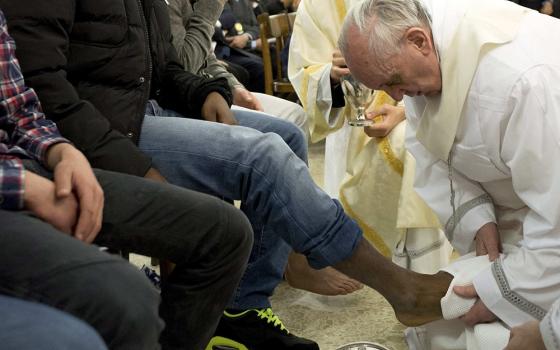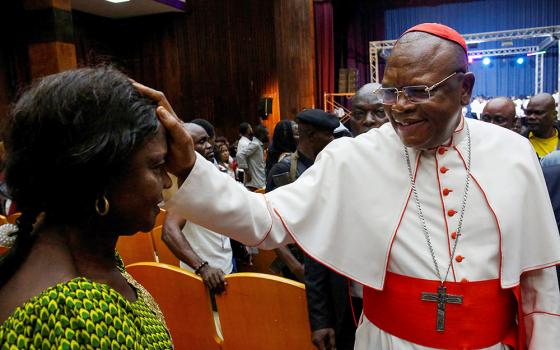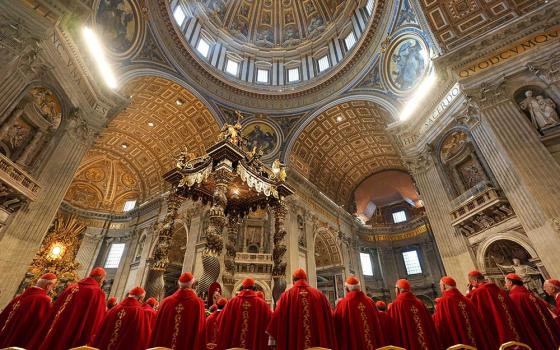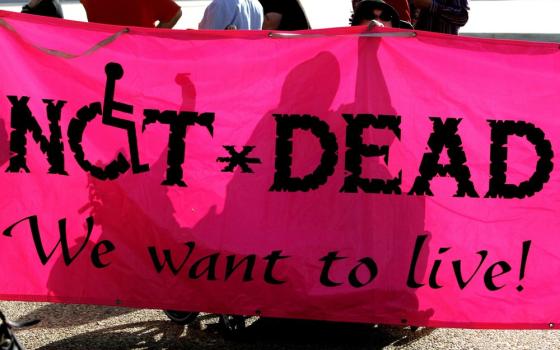
Network Executive director Sister Simone Campbell (CNS/Nancy Wiechec)
After new Federal Communications Committee chair Ajit Pai announced his intentions in April to redo federal policy on net neutrality, the Dec. 14 vote to rewrite the rules should have seemed anticlimactic.
That was far from the case, though, both before, during and after the 3-2 FCC vote along party lines to change the rules. Hundreds of protesters turned out in front of the Washington office building that houses the FCC the day of the meeting to condemn the impending vote.
Thousands more, all of whom said they favor net neutrality, complained that their names had been pillaged and affixed to comments filed beforehand with the FCC that instead stated their support for a change in the rules. The FCC refused requests to release computer data that could have shown the source of these disputed filings.
And, later in January, once the new rules go into effect, look for lawsuits, hearings and bills to reverse the FCC's new policy.
There was also the small matter of Pai, prior to taking the FCC chairmanship, having been a lawyer for Verizon, which, along with Comcast and AT&T, is one of the three big internet service providers which could reap a huge windfall from the rules changes.
Bishop Christopher Coyne of Burlington, Vermont, chairman of the U.S. bishops' Committee on Communications, detailed his desire for an open internet in a Nov. 28 statement. "Strong net neutrality protections are critical to the faith community to function and connect with our members, essential to protect and enhance the ability of vulnerable communities to use advanced technology, and necessary for any organization that seeks to organize, advocate for justice or bear witness in the crowded and overcommercialized media environment," he said.
Another Catholic voice advocating for net neutrality -- the principle that all lawful internet traffic is treated equally -- is Sister Simone Campbell, executive director of Network, the Catholic social justice lobby.
"Net neutrality is essential for the exercise for free speech. It's the new commons," said Campbell, a Sister of Social Service. "When I was in law school and there were free speech suits about shopping malls being the new public square, the court acknowledged it and gave rights, even though they're privately owned," she added. "Now the internet is the public domain about where conversation takes place."
She echoed a point raised by Coyne: "Being serious about freedom of speech, then, means that speech should not be controlled by the ones who own a service or by how much money you can pay to get preference. And quite frankly, for us here at Network, we depend on the internet to communicate with our members. We have significant access through the internet, as well as social media. For us to have those free speech rights superseded by someday who's got wealth and ownership, that means the Constitution's really up for sale. And it's wrong.
"Apart from that," Campbell added wryly, "I don't have any feelings on the subject."
One feature of the new FCC policy is that it allows for paid prioritization. Those sites that offer a lot of streaming are steaming over the possibility that internet service providers, known as ISPs, would charge them extra to use a "fast lane" to assure rapid delivery of their content to the intended users. Netflix, one of the biggest streamers, came out against the FCC plan. As much as they complain, though, they would pass on to consumers the added cost of doing business.
And if there's a fast lane, that means there could be slow lanes, too. ISPs have already been caught throttling users they thought were taking up too much internet bandwidth.
Another feature is the possibility of a tiered internet. This means ISPs could charge separately for email service, internet service, streaming service and any other way they could slice and dice the cyberworld. It would all likely be done in the name of consumer choice, although consumers haven't been griping about this like they did about having to pay for unwatched channels on their cable TV bill.
A third feature takes enforcement of the new regulations out of the FCC's hands and into those of the Federal Trade Commission. The FCC is geared up to take preventive and remedial action; the FTC is not. Some critics of the FCC plan say it is like closing the barn door after the horse has fled. Or, given the speed of the online world, it may be like the barn being burned down and the escaping equines chopped up for horsemeat.
Critics also complain that this would slow innovation. Backers of the new FCC plan say it won't hurt innovation at all. Without the plan having been put into effect yet, it's far too soon to say who is right.
To date, more than 450 communities have publicly owned broadband networks. Some states, after lobbying by ISPs, passed laws forbidding municipalities from establishing networks that compete with ISPs. One state, Colorado, is being sued by 31 counties over the ban.
Advertisement
Speaking of suits, a group of Democratic state attorneys general are preparing to file suit against the FCC, hoping for a stay to the regulations' implementation. They've already filed close to 50 lawsuits in the first year of Donald J. Trump's presidency, challenging administration policies on such subjects as immigration, the Consumer Financial Protection Bureau, and royalties for energy resources extracted from federal lands.
The day of the FCC action, New York state Attorney General Eric Schneiderman said, "The FCC just gave Big Telecom an early Christmas present, by giving internet service providers yet another way to put corporate profits over consumers. Today's rollback will give ISPs new ways to control what we see, what we do, and what we say online. That's a threat to the free exchange of ideas that's made the Internet a valuable asset in our democratic process."
"If this administration continues on a path of ignoring federal law and the constitution, then they'll see us in court," Washington state Attorney General Bob Ferguson told the Hill, a Capitol Hill newspaper. "And, frankly, they'll continue to lose."









